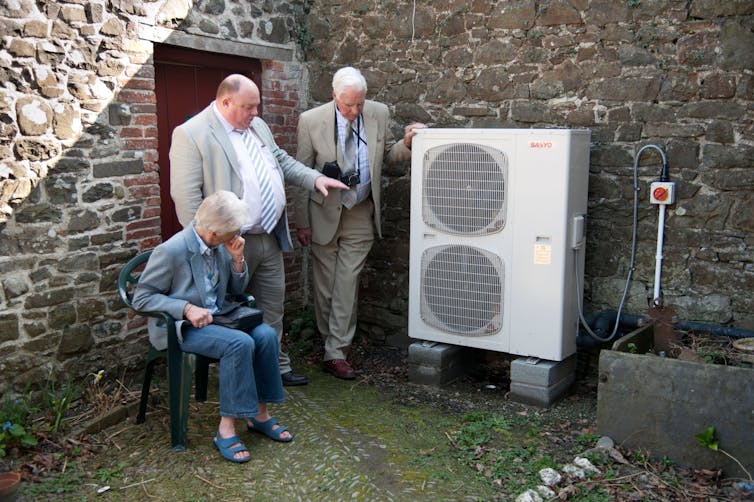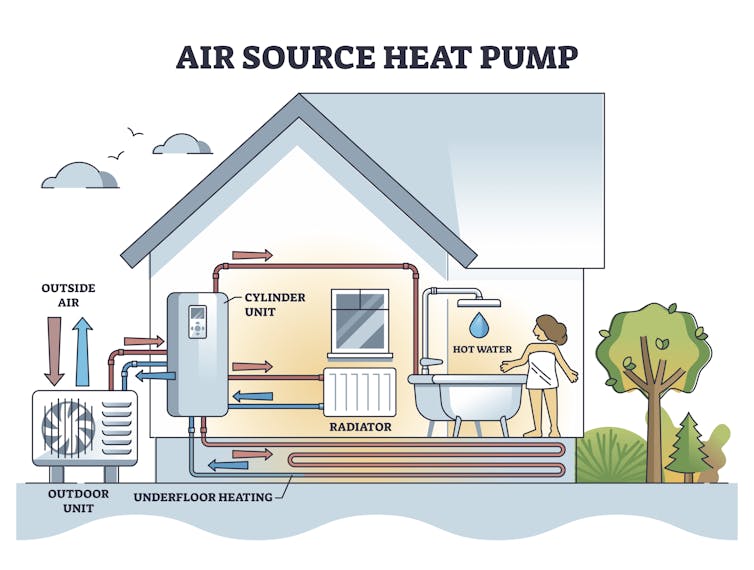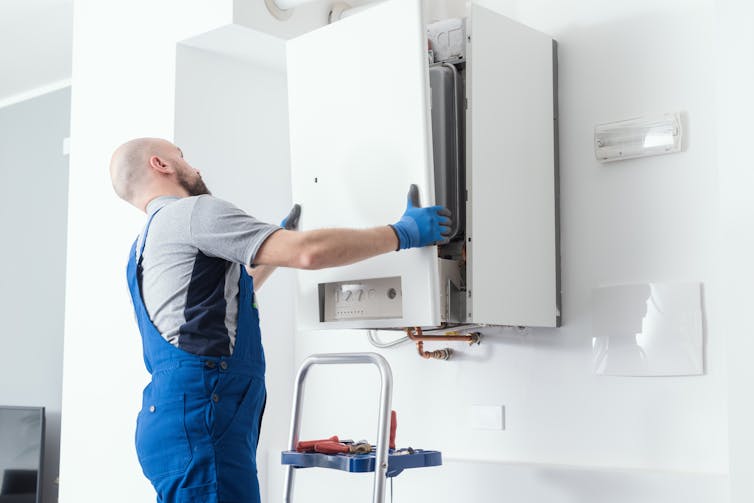Burning gas is a common but environmentally damaging way of heating our homes. Gas-fired heating systems produce up to the equivalent of 380g of CO₂ for each kilowatt hour (kWh) of heat generated. In general, for each kWh of heat generated, an air-source heat pump using energy from non-renewable sources could result in only half as much CO₂ emissions. And renewable sources would mean even less CO₂.
So, through a £5,000 grant, the UK government is encouraging homeowners to switch to air-source heat pumps as a greener alternative to gas boilers. Air-source heat pumps extract heat from the air, even when the air is very cold, to warm water, which is then used in your home’s heating system. How well this works depends on the efficiency of the air-source heat pump.
However, air-source heat pump takeup in the UK is among the lowest in Europe. The upfront cost may seem like an obvious reason why. Even with the grant, installing an air-source heat pump can cost thousands of pounds more than a new boiler.
The government could arguably increase the subsidy. But, as psychologists, we argue that more could be done to change the way people think about air-source heat pumps to encourage takeup.
The way people make decisions is often influenced by “biases”. A behavioural bias does not mean that everyone behaves identically. Rather, we expect a particular behaviour more often than not.
There are three sources of behavioural bias that may affect how people view air-source heat pumps.

Keith Morris / Alamy Stock Photo
1. Ambiguity aversion
People prefer known risks to unknown risks. Air-source heat pumps carry unknown risks as planning regulations are underspecified and vary throughout the UK. This means that planning applications can have unpredictable outcomes.
One of us (Emmanuel Pothos) had his planning application for an air source heat pump delayed because of noise concerns. The planners ignored the government’s recommended guidelines for assessing noise impact and insisted on impractical or expensive options, like an acoustic enclosure or a detailed acoustic survey.
There is also no standard way of reporting an air-source heat pump’s efficiency, making it difficult to compare different models. Invariably, the relevant manufacturer’s information involves large and complex tables of efficiency values against operating and environmental temperatures. This ambiguity makes it harder for people to choose between what are already unfamiliar options.
To reduce ambiguity, the government could introduce greater standardisation in performance reporting for manufacturers and planning permission requirements for planners. Also, by communicating installation risks directly, such as planning permission obstacles, we believe installers might reassure (that there are no hidden risks), rather than put off prospective customers.

VectorMine/Shutterstock
2. Loss aversion
Most people are more sensitive to losses than gains. For example, we tend to pay more for car or home insurance than is required, to protect ourselves from the possibility of incurring large but unlikely losses (such as car theft).
The installation of an air-source heat pump incurs a higher loss than a gas boiler. The extra cost would have to be compensated somehow before homeowners are tempted to consider air-source heat pumps.
But the cost of a heating system is not just the cost of installation. It includes maintenance and running costs too, and the latter depends on how energy prices change. While the initial cost is specific and certain, the costs of maintenance and operation are uncertain and vague.
Our aversion to losses thus likely works against air-source heat pumps.
This could be nmitigated by explicit calculations of “lifetime” costs for a heating system. At current gas prices, switching from a traditional boiler to a efficient air-source heat pump would produce a slight reduction on bills for a typical UK home (according to our calculation). And global gas reserves are only expected to last around 40 years, so gas is unlikely to become any cheaper in the long term. So, looking at lifetime costs could put air-source heat pumps ahead.
3. Availability
Is an air-source heat pump likely to be a good decision or not? We sometimes evaluate decisions based on how easy it is to recall examples from our experience. When choosing between different heating options, you might remember neighbours or friends who have recently installed a gas boiler. By contrast, there would be few such examples for air-source heat pumps given their low uptake in the UK.
But if installers could showcase the number of installations for different geographical areas, instead of offering a handful of testimonials, air-source heat pumps would become more normalised.

Stock-Asso/Shutterstock
Ambiguity, concerns over personal financial losses, and the lack of accessible data regarding successful installations will likely slow air source heat pump uptake in the UK. Financial incentives no doubt help, but the government also needs to address how people think about them if it is serious about greening household energy systems.

Don’t have time to read about climate change as much as you’d like?
Get a weekly roundup in your inbox instead. Every Wednesday, The Conversation’s environment editor writes Imagine, a short email that goes a little deeper into just one climate issue. Join the 10,000+ readers who’ve subscribed so far.




